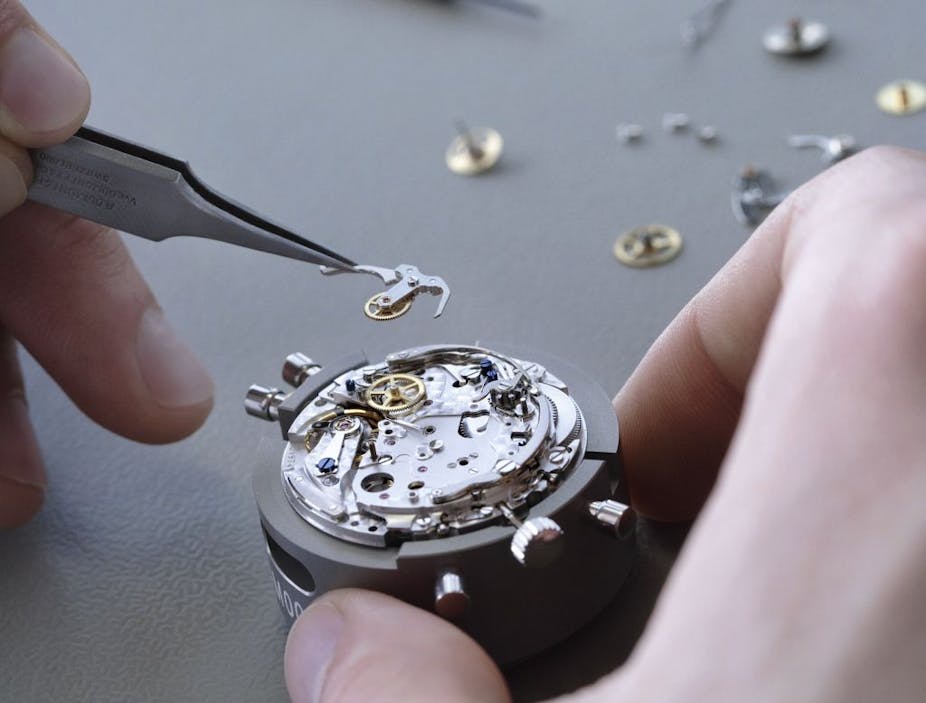Apple’s entry into the watch market has many questions raised about how their new device will fare. One is how disruptive this new watch technology will be for the existing market. With speculation that the elite version of the Apple Watch could cost as much as US$5,000 or $10,000 with customisation options, it’s worth considering what kind of an impact this will have on the long-established luxury watch industry and its Swiss heartland.
Research I conducted with colleagues into the how the Swiss watchmaking industry responded to the introduction of quartz watches by Japanese producers in the early 1970s can help shed some light on the impact of today’s new technology: the smart watch. Our analysis looked at how a disruptive technology – as the quartz watch then was – affected the industrial dynamics of traditional Swiss producers of mechanical automatic watches.
Quartz watches were not only much cheaper, but even much more accurate than mechanical watches – anyone who owns an automatic watch knows that it is always a few minutes late. Now, 40 years later, the Apple Watch may represent a similar challenge to Swiss watch producers, even though the nature of the disruption is quite different.
Market niche
The most interesting result we found from our analysis was that the Swiss firms which focused on improving and developing their mechanical watches were more likely to survive the turmoil of the 1970s and 1980s. Not all Swiss companies stuck with their existing technology – some started producing quartz watches – and tended not to fare as well.
These results highlighted the existence of what’s called “non-overlapping market niches”. The fact is the new competition quartz watches appealed to a different market. Buyers of expensive mechanical watches were willing to pay high price premiums and would have never switched to the new cheaper alternative. Meanwhile, quartz watches appealed to a different category of watch buyer. With a starting price of US$349, it would seem that the Apple Watch for the most part will still fall under the “newer and cheaper” category.
High-end and heritage
Another important differentiating factor for Swiss watchmakers is that they are an elite population with a very strong identity. They are well represented by the “Swiss made” label, proudly exhibited by the Federation of the Swiss Watch Industry and targeting high-end customers.
This is something that you can truly feel when you climb up the “Watch Valley” to La Chaux-de-Fonds to visit the International Museum of Horology, where you can surprise yourself by observing decades of history of Swiss automatic watches. People who buy into this heritage will not necessarily view smart watches like Apple’s as a comparable product.
In more recent times, a consolidation process has taken place, creating larger and stronger players with deeper pockets, which puts the Swiss watchmaking industry in an even stronger position. Many independent producers were bought by large groups like Swatch and LVMH, which provided them with the needed resources for sustaining innovation and global competition. Their total export was 21.8 billion Swiss francs worldwide in 2013, of which the vast majority is still represented by mechanical watches.
So, if you were to draw a direct comparison between what kind of a threat the Apple Watch may have on the traditional, mechanical watch industry and that of the quartz watches that entered the watch market in the 1970s, you’d conclude that the Apple Watch will not be a considerable threat.
Different kind of disruption
But there is an important difference between the Apple Watch and quartz. The innovation of quartz had to do with the core functions of a watch: it made it more accurate and cheaper. The Apple Watch has been presented as a wearable device, doing much more than keeping time. Its disruption has not to do with higher efficiency, but with the introduction of cool new applications.
Meanwhile, the market for the Apple Watch may not be so distinct from that of luxury mechanical watches. Certainly with Apple’s higher-end product that costs into the thousands of dollars. So a certain overlap could emerge at some point in terms of luxury spending. Apple will not, however, be able to compete with the heritage of the Swiss watchmaking industry.
But, it’s worth noting that when Apple releases new products they have generally beaten expectations of their success. And they have attacked established markets that, at the moment of the their launch, were not seen to be closely related. So, while time may stand still in the Swiss valleys, their traditional watchmakers would be mindful not to underestimate the potential an Apple Watch has to disrupt their market.

